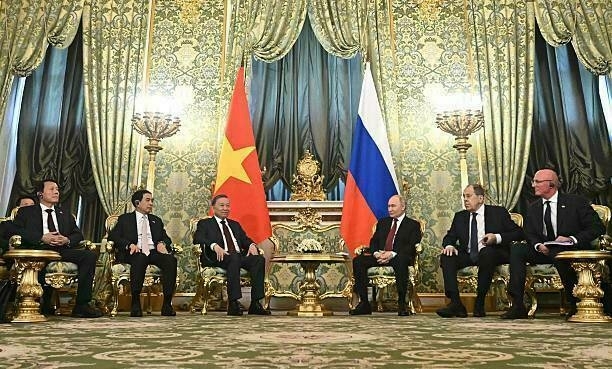
Moscow and Hanoi agreed to negotiate and sign agreements to construct nuclear power plants in Vietnam, the two countries said in a joint statement on May 11.
“The development of the plants with advanced technology will strictly be compliant with nuclear and radiation safety regulations and for the benefit of socio-economic development,” they said in the statement, Reuters reported.
Vietnam and Russia have long had close relations, dating back to the Soviet Union’s support for North Vietnam and its proxy forces during the Vietnam War. Hanoi has so far maintained a neutral stance regarding Russia’s war against Ukraine.
The agreement comes as Vietnam’s Communist Party’s General Secretary To Lam visited Moscow for Russian President Vladimir Putin’s Victory Day celebrations.
As Vietnam aims to support its fast-growing economy, the country is committed to increasing its power generation capacity through the use of nuclear energy. Seeking to diversify its economic partnerships, Hanoi previously said that it look for various foreign partners to build the power plants, including the United States, France, South Korea, and Japan, Reuters reported.
The country previously said it aims to deliver nuclear power generation with its first plant opening between 2030 and 2035.
The joint statement between the Kremlin and Hanoi also noted that Russia will expand crude oil and liquefied natural gas (LNG) exports to Vietnam, while Vietnamese oil companies will have a larger presence in Russia in the coming years.
Amid its full-scale invasion of Ukraine, Russia has sought to find new trading partners willing to accept Russian oil and LNG exports, as Western allies continue to cripple Russia’s economy through economic sanctions.
On Jan. 1, Ukraine terminated Russian natural gas transit through its territory, cutting off access to the European market.
Putin previously visited Hanoi in June 2024 when the two countries agreed to deepen their strategic partnership and signed over 10 documents, including a memorandum on the schedule for establishing a nuclear technology center in Vietnam.
 The Kyiv IndependentThe Kyiv Independent news desk
The Kyiv IndependentThe Kyiv Independent news desk
